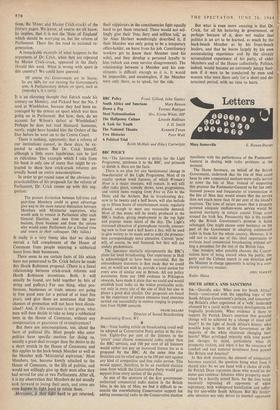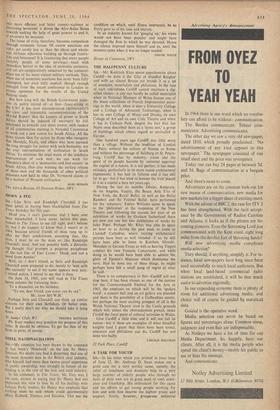SOUTH AFRICA AND SANCTIONS SIR,—Quoodle asks: What now for South
Africa? Surely—confronted with the appalling logic of the South African Government's policies, and remember- ing Britain's other experience of a 'yolk' leadership obsessed by a racial myth—certain developments are tragically predictable. What evidence is there to support Sir Patrick Dean's assertion that peaceful change will be achieved by a 'change of mind and heart'? In the light of South Africa's history what possible hope is there of the Government or the majority of the white electorate changing their hearts? What privileged minority with total power just changes its mind, particularly when its prosperity rockets, and when it has the assurance of comfort and vast material investment from powers like Britain and America?
In this dark situation, the element of compulsion becomes essential, the question being what form it should take. So we are faced with a choice of evils. Sir Patrick Dean represents those who would let the status quo continue: fabulous white prosperity main- tained by a heavily armed State, for the time being massively repressing all opponents of white supremacy, with widespread humiliation and suffer- ing for non-white South Africans. But this intoler- able situation not only drives its internal opponents into more efficient and bitter counter-violence or increasing terrorism; it drives the Afro-Asian States towards seeking the help of great powers to end it, if necessary by invasion.
The lesser of evils, therefore, becomes compulsion through economic forces. Of course sanctions are risky, yet surely less so than the chaos and whole- sale violence otherwise building up through frustra- tion and bitterness? It is fascinating that many people (notably people of some privilege) • react with immediate horror to the idea of economic pressures, and yet are comparatively unmoved by the common- Place use of far more violent military methods. This, when use of economic sanctions has never been fully attempted, nor even fully studied; though enough etnergid from the recent conference in London to arouse optimism for the results of the United Nations study.
But how long will the British Government main- tain its paltry record of—at best—fence-sitting at the UN? It has even misunderstood (deliberately?) the clear and reasonable recommendations of the Myrdal Report: that the keepers of power in South Africa should be induced (if necessary by full sanctions) to concede and share power, with leaders of all communities meeting in National Convention to work out a new course for South Africa. All the More reason then for action by those who recognise that Mandela, Sisulu, and others who have pursued the long struggle for justice with such humanity, are the true representatives of civilisation in South Africa. To minimise the cruel waste of the indefinite imprisonment of such men, we can work for Mandela's ideal of a `democratic and free society' in South Africa, thus also winning the earliest release of these men and the thousands of other political Prisoners now held in what Dr. Verwoerd claims to be a bastion of Western civilisation.
MARY BENSON



































 Previous page
Previous page